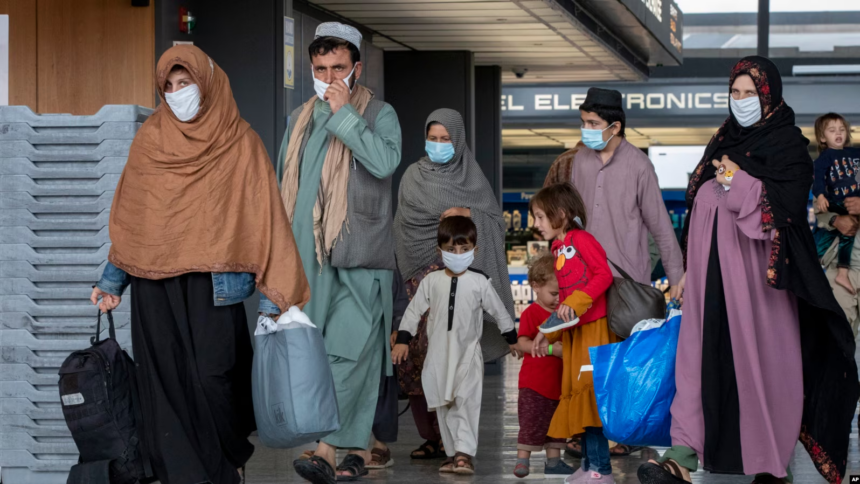RASC News Agency: In its latest report, the Middle East Institute has sounded the alarm regarding the deteriorating plight of Afghanistani nationals who had served as translators, guides, and aides for U.S. military forces during America’s two-decade-long engagement in Afghanistan. Many of these individuals, unable to secure evacuation, remain in hiding within Afghanistan, living under constant threat of Taliban persecution. The Institute highlights the sharp disconnect between the reality on the ground and the Trump administration’s narrative. Despite Afghanistan’s escalating security crisis, officials from the Trump administration maintain that conditions in the country have sufficiently improved to warrant the return of Afghanistani refugees. Such assertions have provoked fierce criticism from humanitarian organizations and human rights advocates alike.
According to the report, as of early 2025, an estimated 110,000 Afghanistanis were still trapped inside Afghanistan, while 90,000 others awaited resettlement from third countries. Many have endured prolonged, bureaucratically onerous vetting processes, only to find themselves in limbo. Yet, one of President Donald Trump’s first executive actions upon his return to office was to suspend the Afghanistani Resettlement Program, a move widely condemned by refugee advocacy groups. In a controversial move in April, the U.S. Department of Homeland Security declared that Afghanistan now met the conditions necessary for the safe return of its nationals. Tricia McLaughlin, a senior DHS official, confirmed to reporters that Temporary Protected Status (TPS) for thousands of Afghanistanis had been revoked. McLaughlin explained that the decision, made in consultation with the State Department and other federal agencies, was based on a reassessment that deemed Afghanistan no longer eligible for humanitarian protections.
The Middle East Institute further reports that approximately 180,000 Afghanistanis were evacuated to the United States following the Taliban’s seizure of Kabul in August 2021. A significant number of these evacuees were granted Special Immigrant Visas (SIVs), which allow for lawful permanent residency in the United States. However, sources close to the former Afghanistan’s government caution that Taliban forces continue to hunt those perceived as collaborators with U.S. and NATO forces. Former interpreters, logistics personnel, and aid workers remain at acute risk of retaliation, forcing many to live in secrecy, even as they await the uncertain outcomes of resettlement applications.
The report also underscores the Trump administration’s intensified efforts to prioritize the deportation of Afghanistanis admitted under emergency evacuation programs. DHS data reveal that between July 2021 and January 2022, over 79,000 Afghanistani nationals entered the United States, many under humanitarian parole. Adding to the complexity, the Middle East Institute cites concerns raised during a recent Senate Intelligence Committee hearing. Joe Kent, a Trump-endorsed candidate and former intelligence officer, accused the Biden administration of “grossly inadequate” vetting of Afghanistani evacuees. Kent claimed that the National Counterterrorism Center had identified more than 1,400 individuals among the evacuees with potential links to ISIS-Khorasan (ISIS-K), though concrete evidence remains sparse.
The report also criticizes the Trump national security team for attempting to conflate refugee resettlement with domestic terrorism threats. In a January interview, Michael Waltz, National Security Advisor under Trump, alleged that terrorist organizations such as ISIS, al-Qaeda, and Hamas had exploited refugee movements to establish networks within U.S. borders. These claims, largely unsubstantiated, have fueled anti-immigrant rhetoric in political discourse. Meanwhile, the 2025 Annual Threat Assessment issued by the U.S. intelligence community designates ISIS-K as a major external threat to U.S. national security. The report also references the recent arrest of an Afghanistani national allegedly involved in plotting a terrorist attack on American soil an incident that has further intensified the debate over immigration and national security policy.
Amid rising anxieties, human rights groups continue to urge the U.S. government to fulfill its moral obligations to Afghanistani allies who risked their lives in support of American missions. Advocates warn that abandoning these individuals would not only constitute a humanitarian failure but also undermine America’s global credibility and commitment to its wartime partners.






